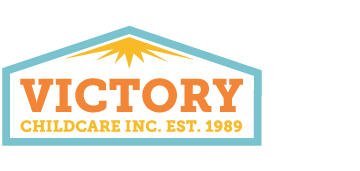Our Story
Over 25 years ago, my husband Frank saw an advertisement in the local newspaper, looking for a childcare provider to establish a brand new program. At the time, my program was a small in-home facility caring for just a few children. He made a phone call and got me an interview.
Our initial program at Club Fed Child Care Center provided educational services for thirty children, caring only for Toddlers, Pre-school and Pre-kindergarten children. To meet the growing need of the community, we rebuilt and expanded three times to our current program, which educates 121 children – classrooms for Infants, Toddlers, Pre-school, Pre-kindergarten, After-school and Summer Programs.
We built Victory Child Care as a place for children, in service to their families. Children are at the center of what we do – they guide us in our decision making, inspire us to do our best work, and bring us all immense joy every day.
My four daughters are graduates of Club Fed. If ever, as a mother, I’ve ever doubted the importance of quality childcare and the opportunities it affords children, I only need to look to them. Club Fed prepared them for the future, preparation that still supports them today – as a Cardiologist, Entrepreneur / Educator, Marketing Executive and Stanford Fellow.
It would be our honor to care for and educate your child in one of our programs.
- Victory Lynn Riedy, Ed.M., Founder
Mission
At Victory Child Care, Inc. we recognize children as thinkers. We invite children to construct their world in a rich and responsive environment, where there is opportunity for children to become emotionally confident, intellectually enthusiastic and empathetic towards others.
Educational Philosophy
By providing curricula rich, play-based programming within which there is continuity of adults and routines that support children, learning takes place through a conversation between teacher and child. We respect individual children’s agendas for learning and think of children as theory builders, not empty vessels.
Early childhood research tells us that children learn best when educated professionals think first about how children of a particular age learn and then create an environment and experiences that supports that learning. Our educators spend a great deal of time observing and recording children’s learning, so that they can create effective interactive experiences that challenge and stimulate each child’s learning through purposeful play and exploration, that supports the interests and experiences of the children in the classroom. We help children to construct their world by asking questions that have many answers and by planning engaging educational experiences that help children develop new skills and learning. Our day is structured, yet flexible enough to allow for individual children’s energies and interests.
We also understand that children learn best when they are able to focus on the task at hand, therefore we guide children towards assertive self-regulation skills in a secure and loving environment that provides emotional stability. The better children understand their own emotions and feelings, the better able they are to take control over their own behavior. At the core of our program is children’s social and emotional development and growth. Teachers support children’s development of cooperative play skills, attend to the development of healthy self-esteems for children, ensure that children are comfortable to express their needs and feelings, and guide children in the understanding of the emotions and actions of their peers.
We celebrate each child and it shows in the diverse fabric that makes up our teaching staff and student community. We acknowledge that children are nested in families and communities, our classroom environment and activities reflect those families, as well as our global family. We strive to make families, not just children, at the center of our work. Therefore, we are eager to learn about each child’s family, cultural origin, talents, abilities, experiences and current circumstances; so that we can form a lasting partnership with the children and families we serve.
We cultivate a program where teachers are present in the moment - by being the teacher that the child needs at that moment.




